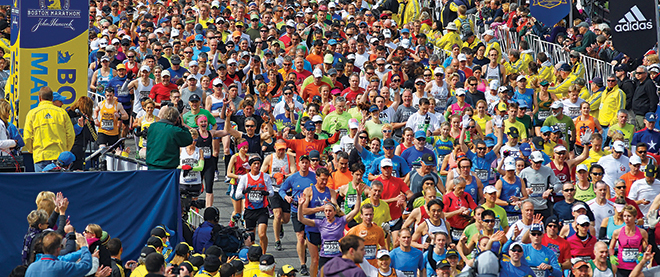The Boston Marathon: No finish line in sight
Despite the tragedy, runners will line up hundreds deep next year, says writer Margot Livesey
Stew Milne/AP
Share

Years ago, before I knew that Boston was a place where I’d live and teach for many years, I visited the city. A friend was here with her small daughter, staying in a downtown hotel and together, after lunch, we walked down to stand at mile 24 of the Boston Marathon. It was close to two o’clock when we took up our station but the sidewalk was still thick with spectators. The winners had already crossed the line almost two hours earlier. The people we watched were more or less ordinary women and men who had trained for months, running before and after work, on race tracks and roads, to qualify to run the oldest marathon in America, and indeed the world.
By mile 24 the runners were exhausted, dishevelled, many of them at the end of their endurance, running slowly, some barely jogging. We shouted, “You can do it,” “Keep going,” “Well done.” We offered them what we could: our praise, our encouragement, our belief that they would make it. I noticed that tears were running down my cheeks as I watched. My friend’s eyes were watering too. There was something magnificent and deeply moving about these runners working so hard to finish what they had begun months before. As we stood watching beneath grey skies, the runners grew wearier, the spectators sparser. We shouted harder. I don’t remember who won that year or whether a new record was set but I do remember those women and men running and running.
As soon as I woke up this Monday I heard the difference in the city sounds. Patriots’ Day, the day the marathon is run, is a public holiday in Massachusetts and except for the occasional helicopter everything was quieter than usual: fewer buses, no schoolchildren, fewer people going to work. The weather seemed well-nigh perfect: sunny but not hot, with almost no wind. It was, I remarked to my husband, a beautiful day for a marathon. A colleague had qualified to run, a long-held ambition, and she had been training hard. Although I couldn’t go to cheer her on, as I worked through the day, I pictured her at different points on the journey.
I can’t exactly say when I began to notice that the sounds of the day had changed. The Monday quiet had given way to more helicopters and there were sirens every few minutes. When I checked my email for news of my colleague I learned simultaneously that she had finished and that two bombs had exploded. But she and her family were only a block away when the bombs went off. Later that afternoon she sent an email describing how her children had seen volunteers covered in blood, rather than their mother covered in triumph. “This is not the Boston Marathon I want to remember,” she wrote.
Since then the city has been swirling with false alarms and rumours. There’s a bomb at Harvard Square, there’s an explosion at the Kennedy Library, 15 blocks of the city are being treated as a crime scene. What is suspicious? Who is suspicious? On the radio a surgeon talks about treating the wounded. This is different, he said, because they were hurt intentionally.
His words took me back to another way in which yesterday’s marathon was different. At the starting line in Hopkinton the runners observed 26 seconds of silence, not in anticipation of the miles they were about to run but in memory of the victims of the shooting at Sandy Hook Elementary School. Next year I imagine there will be silence for the victims of this year’s violence and I imagine that, despite everything that’s happened, the runners will, once again, be lined up hundreds deep. Next year I’ll take the day off to go and cheer them on.
Margot Livesey is the author of the novels The Flight of Gemma Hardy, The House on Fortune Street, Homework, Criminals, The Missing World, Eva Moves the Furniture, and Banishing Verona. Born in Scotland, Livesey lived for a time in Toronto and has Canadian citizenship. She currently lives in the Boston area and is a writer-in-residence at Emerson College.